5 Centimeters Per Second: A Stark Portrayal of Romance
Makoto Shinkai’s 5 Centimeters Per Second is a story of anguish and longing, following the life of Takaki Tohno, his relationship to Akari Shinohara, and the growing distance between them. Divided into three parts, Shinkai presents the bond established between these two characters at childhood, traces Takaki’s growth—or lack thereof—as he enters high school, and later, the adult world.
Contrary to the idealized depiction of love and the “happily-ever-after”s one comes to expect from traditional romantic fiction, Shinkai subverts typical romantic norms in favor of a more realistic portrayal of love and relationships. Shinkai comments on the naivety of idealized romance, the notion that a couple will surmount whatever obstacles they encounter, and blends the lines of dream and reality in order to create a painfully conflicted and somber reflection.
Below is an English-subbed trailer of the film for those of you who are interested in checking it out, and as a word of warning, this article does contain multiple spoilers.
Cherry Blossom
During the first part of the film, “Cherry Blossom,” Takaki reflects on how his relationship began and developed with Akari—a girl whom he meets when she arrives at the same elementary school as him. After becoming close friends and graduating, Akari tells Takaki that her family is moving—a thing which occurs often in both Akari and Takaki’s families. Despite their separation, they promise to write letters and visit one another. As time passes, Takaki learns that his family will be moving farther away from where Akari is living, so the two of them decide to see each other one last time before that happens.
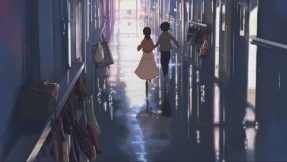
Shinkai’s use of retrospective narration allows him to comment on the naivety of childhood romance. The decision to tell the story in such a manner lends a greater sense of sadness and longing to all acts and events; the dread of the inevitable casts a long shadow over the past, yet it is this same understanding that creates urgency. Memories fade and details grow dim, but this is what leads the individual to feel all the more strongly as one laments the loss of something that used to hold great meaning. Thus, when Akari responds to Takaki’s letter, regarding his family’s moving, “It’s pretty far away this time, isn’t it? When the time comes, it will no longer be a distance which would allow us to just get on a train and meet each other. As I thought, it’s going to be a little lonely,” Akari’s alluding to the possibility that their relationship will be torn asunder lends a tone of tragic irony to her words.
It acknowledges the likelihood of losing touch with one another, which thereby comments on the traditional belief that despite the obstacles, a couple can manage to make a long-distance relationship work. However, even though Shinkai presents Takaki as understanding of this, he still has Takaki go forward with believing they can stay together: “That we could not be together forever after this was a fact I clearly grasped … but the anxieties which I had caught sight of soon melted away. And after that, only Akari’s tender lips remained.”
In this instance, Shinkai presents the younger Takaki as actively choosing to set aside the inevitable in favor of the faintest glimmer of hope. In doing so, Shinkai suggests that without the wisdom of age that is necessary for weighing one’s feelings against the circumstances, the individual is more likely to cling to the things that sway him most for the time being; for the 12-year-old Takaki, that “something” is his love for Akari. This is why Shinkai’s decision to have Takaki look back on the events of his childhood love, rather than have him narrate at the time when he was 12 years old, purposefully shapes the presentation of Takaki’s relationship in a significant manner; one may try to blind oneself to the future in order to live in the present, but hindsight makes that impossible.
Takaki’s telling of his childhood love story serves not just to detail the events of his romance, but to reflect on the naivety of his former beliefs. As a result, when Takaki claims, “we would be together from then onwards. For some reason, that’s what I thought,” his use of the phrase “for some reason” acknowledges the blind innocence of his former mentality. To have life turn out exactly the way we want it to would certainly be ideal, but it is not realistic.

M.H. Abrams’ comparison of realistic fiction to romantic fiction reinforces the notion that Shinkai’s portrayal of the younger Takaki’s beliefs is meant to be a commentary on the traditional ideals of romantic fiction: “Realistic fiction is often opposed to romantic fiction: the romance is said to present life as we would have it be, more picturesque, more adventurous, more heroic than the actual; realism, to present an accurate imitation of life as it is” (152). In addition to Shinkai’s use of retrospective narration, he incorporates the role of fate as part of the machinery of realistic romance. As an active force in shaping the outcomes of a person’s life, Shinkai presents fate as indifferent to a person’s struggles, commenting, again, on the notion that a couple can overcome whatever obstacles they encounter.
The thematic weaving of helplessness reinforces the idea of the futility of struggling against fate in favor of an idealized result. When Akari discusses with Takaki the fact that her parents will not allow her to go to the same secondary school as him, Takaki reflects: “I understood perfectly that Akari had been hurt, but … I couldn’t do anything about it.” In this instance, Takaki’s sense of helplessness is emphasized not only by the phrase, “I couldn’t do anything,” but the fact that he pauses before he speaks this line suggests that it is a difficult thing to admit—as though to say it is the same thing as to give in to fate’s dictates. As a result, Shinkai presents the younger Takaki as constantly struggling.
This is most noticeable in the way Shinkai portrays nature as a force of fate, not only through its physical hurdles, but through its foreshadowing of Takaki’s separation from Akari, and the consequences that follow from their separation. The first element of foreshadowing can be observed with how the snow repeatedly forces Takaki’s train to be delayed as he travels to meet with Akari: “Time, clearly as if it had a malicious intent, slowly ebbed away above me. I clenched my teeth, and keeping myself from crying was the only thing I could do.” In this instance, Takaki’s reference to “Time” as having “malicious intent” implies that he feels fate is purposefully working against him—seeking all opportunities to distance himself from Akari. His sense of frustration is suggested by the fact that he “clenches his teeth,” and his helplessness is evoked by the phrase, “keeping myself from crying was the only thing I could do.”
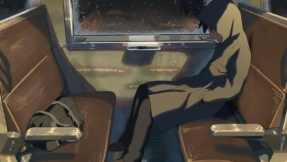
Since Takaki removes his watch, when the snowstorm forces the train to stop for a long period of time, it signifies his refusal to accept “the malicious intent of Time,” or, the decision of fate to keep them apart. Another instance that shows how nature functions as a force of fate can be observed in the way the wind steals the letter that Takaki plans on giving Akari—a letter detailing all of his thoughts and feelings for her. The significance of this moment lies not only in fate’s decision to sabotage Takaki’s efforts, but it can also be metaphorically interpreted as representative of how Takaki’s life turns out; forever in a state of longing, constantly hoping his feelings reach and stay with Akari, and a painful feeling of emptiness and unfulfillment with the state of his life.
When Takaki sets out for his journey in the first place, Shinkai’s presentation of nature as suddenly appearing barren and empty, after being populated with life, reflects how Takaki’s relationship turns out with Akari: “in the blink of an eye, the buildings in the scenery became sparse …. The invisible winter wasteland outside the window, the flowing away of time, the painful hunger, all these things gradually wore down my heart.” Perhaps the most powerful example of nature as a force of fate can be observed when Akari and Takaki look on at a leafless cherry blossom tree, and Akari ironically refers to the falling snow as cherry blossoms: “Doesn’t it somehow resemble snow?”
This image showcases how a person longing for the ideal may skew their perception of the present for a more favorable reality; instead of witnessing bright, vibrant cherry blossom petals falling, all that is there is the cold, indifferent snow, gradually burying a stark, naked, cherry blossom tree that is vulnerable to the forces of the world. Thus, this moment embodies the same idea as Takaki choosing to focus on something more beautiful and meaningful to him—the hope that he will forever be with Akari—than accepting reality for what it is and the inevitable fate of his relationship.
Cosmonaut
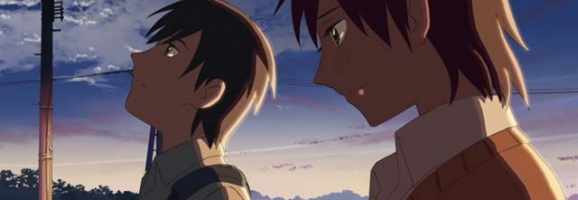
In the second part of the film, “Cosmonaut,” the story is set in another town Takaki and his family have moved to, narrated primarily by Kanae Sumida—Takaki’s classmate and friend. Shinkai’s presentation of Kanae’s relationship to Takaki illustrates the torment of unreciprocated love and reinforces the futility of fighting against fate. As Kanae reflects on her relationship to Takaki, her feelings towards him suggest the sentiment of struggle: “It was scary, and each day was filled with anguish. But feeling happy everytime I met him, was something about myself that I couldn’t do anything about.”
In this instance, Kanae’s struggle is a result of the need to express her feelings while feeling completely helpless in attempting to do so. Shinkai’s negative portrayal of the consequences love has on the individual thereby comments on the belief in traditional romantic fiction that one’s love will eventually be reciprocated. Yet this is clearly not the case for Kanae. Shinkai’s refusal to allow her to express her feelings, let alone have them reciprocated, indicate that “happily-ever-after”s are not to always be expected in real life.
Characters do not necessarily fall in love with one another simply because one person feels a certain way, as every individual has their own emotional troubles to deal with—a fact that Kanae comes to understand when she realizes Takaki is constantly thinking of someone else: “Tohno-kun has always … been looking at something far beyond, far higher than me.” The scene where Kanae finally breaks down into tears in front of Takaki thereby reinforces the notion that one’s love will not always be reciprocated, and that struggling with fate’s finality is futile. This is the reason why Shinkai juxtaposes this moment with the spaceship being launched: “To desperately and blindly stretch out our hands towards the heavens … and to fix our eyes on something in the darkness of the far reaches of space.”
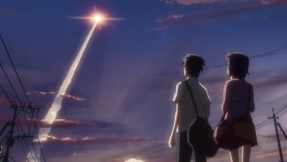
This line conveys the inherent struggle of an individual’s feelings of love, for despite the fact that we do not know what lies in store for the future, we are constantly trying to shape it with our free will. Another feature to consider, despite its few appearances in the second part of the film, is Takaki’s dialogue. As Kanae attempts to understand who Takaki is, Takaki’s struggle with fate is expressed in momentary exchanges. For example, when Kanae tells Takaki, “I’m not even sure about tomorrow,” Takaki responds with, “I think, everyone is like that.” While such a statement may appear to a passerby as “simply making conversation,” the knowledge of the first part of the film alerts the viewer to the idea that Takaki is still dwelling on his relationship with Akari. Uncertain of the future, Takaki tells Kanae, “I am full of hesitation.”
The significance of this line is that it echoes the same anguish Kanae expresses about the experience of longing for another. Shinkai thereby shows how time serves as an active agent in shaping a person’s perception of life. Especially when the characters are still at such a young age, they cling to what little experience they have in order to survive in the world. Takaki’s decision to stop communicating with Akari through text messages is thus important to consider. It showcases Takaki’s attempt at finally pushing beyond the naïve dream of ending up together with her, in order to survive in a world where life and love are not decided by the individual, but rather by the dictates of fate.
However, Takaki’s thought of, “When did I start typing messages that are never sent?,” invites the idea that Takaki is surprised with himself—surprised that he would give up on something he has cared about since childhood, something which has had so much meaning for him.
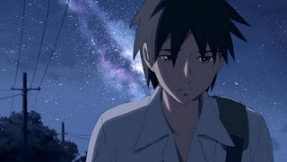
Shinkai’s presentation of Takaki’s conflicted emotions thereby presents a realistic portrayal of the individual: that we are contradictory, uncertain, at times confident, at times desperate, and that no matter how hopeless reality may seem, we still cling to the memories of moments that were once most precious to us. Takaki’s comment about the spaceship being launched into space reinforces the notion of clinging to the ideal despite knowledge of the inevitable: “they say it will continue traveling through the solar system and beyond … No matter how long it takes.” Shinkai’s presentation of Kanae and Takaki’s looking up into space thus shows how important a role nature plays for the individual. We are uncertain of the unknown, yet we look towards it with hope; we don’t know what the future has in store for us, but we know that there is a range of possibilities. And the knowledge that there is even the slightest chance that things will turn out just the way we want it to, motivates us to strive forward, to cling to the idealized, and fall when fate hands us a different hand.
5 Centimeters Per Second
The third part of the film, “5 Centimeters Per Second,” is perhaps the most bitter in tone, and the most stark in its depiction of the consequences of clinging to the ideal. As Shinkai presents Takaki as continuing to experience feelings of longing and sadness, perhaps even entering a depressive state, the results are portrayed as devastating. As an adult, Takaki struggles to find a purpose for himself; he has a job—which he quits after a brief period of time—, he has been in relationships since high school—though all of them have been short-lived—, and he still clings to his memories of Akari. This can be observed in the way the sight of a cherry blossom floating into his room from the window causes him to stop what he is doing and go outside: “Thinking back to that day surely, that person must also strongly feel it when she thinks back.”
Takaki’s reference to Akari as “that person” can be interpreted in a few ways: either, he feels his connection to her has grown so distant that she appears more as a faint, pleasant dream than a once living reality—a thing which is reinforced by Akari’s thought of, “I saw a dream from long ago”—or it could be Shinkai’s decision to present Takaki’s relationship to Akari as one of the countless instances that have occurred to other former couples who have grown apart. In this case, the film may be allegorical as presenting Takaki’s journey as a kind of “rite of passage” that perhaps all individuals at some point in their lives experience.
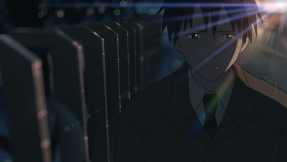
However, it is difficult to say whether this is the case or not as Shinkai presents Akari as an adult and happily engaged to another man, conveying the notion that perhaps Takaki’s inability to reconcile the past with the present is a unique case that does not occur that often. Regardless of whether either of these possibilities are intended, Shinkai’s portrayal of love and the consequences it has on the individual appear rather pessimistic: “When I at last noticed, my heart had already become hard … And on a certain morning, when I at last came to an earnest realization, that I had lost everything that was beautiful.”
The fact that Takaki devotes himself completely to his memories of Akari, while shunning almost all other aspects of life as he lives in an isolated state, reinforces how important such memories can be for the individual, and how hoping for the ideal, instead of accepting reality, restricts oneself from personal growth. The very ending of the film highlights this as well as Takaki passes by Akari without noticing until it is too late. Since Takaki is shown as constantly walking alone with a brooding, somber look on his face, it suggests that Takaki is so immersed in his own world and feelings that he barely notices the world going on around him—even the woman who he had fallen in love with and thinks about obsessively since then. However, the depiction of this “crossing of paths” is ambiguously presented.
Even though Takaki notices Akari passing by, after a few moments where his vision of her is interrupted by two trains crossing, she immediately disappears from his sight, leaving the viewer to wonder whether or not she was actually there, or if she was simply a manifestation of Takaki’s feelings of longing. As the second part of the film features a kind of convergence of dream and reality, as Takaki struggles to accept the present and break free from his dwelling on the past, it is possible that Shinkai continues this theme to the very end of the film.

If this is the case, then Shinkai may be using this moment to directly attack the tradition of romantic fiction. Instead of having the couple end up together, despite all the anguish and strife they have encountered, Shinkai seems to present such a notion as a naïve, hopeful illusion; that life does not cater to each individual’s wants, but rather plays out in the manner it is set for by fate. Therefore, Shinkai’s presentation of love and relationships in the film comment on the idealized depictions of romantic fiction. Shinkai presents life as predetermined by the dictates of fate, so despite how much we may struggle and long after another, there are always circumstances that are out of our control. The use of retrospective narration allows for thoughtful reflection and an understanding of the differences between what is realistic and ideal, and the presentation of the individual’s relationship to nature as a representation of one’s journey into the unknown, as well as a force of fate, allows Shinkai to shape his commentary, and to create a beautiful, moving tale that resonates with countless individuals.
Works Cited
Abrams, M.H. A Glossary of Literary Terms, 5th Edition. San Francisco: Holt, Rinehart and Winston, Inc.m 1988. 152-154.
What do you think? Leave a comment.







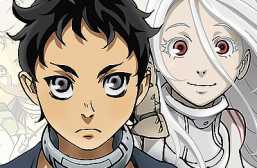
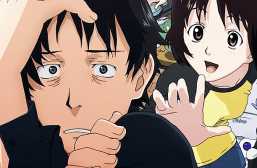
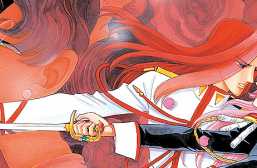
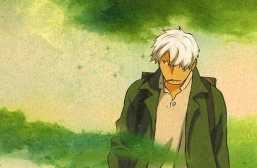
I dunno where to even begin, everything about this movie is just PERFECT !! The artwork and cinematography is fantastic and totally out of this world. Those gorgeous images of the dark sky, snow falling on the empty streets, the train passing through the dark – It all will make you longing to be there.
And then the story of distance & lost love, which might evoke memories of your first school love/crush. After the first episode, I was thinking of how cellphones have killed the romance in some ways. That fear, the thrill – if she’s still waiting, that sweet pain..
the second episode was pretty good and then the third one hits you on the face with the hammer called – life, the reality of it.
This movie might make a special place in your heart.
Agreed; there are definitely a lot of things about this film that separate it from the generic romance anime. Thanks for the read!
My husband loves this film so much that I bought him the blue-ray for Xmas ($100!) We also downloaded the theme music but have lost the cd and now the link no longer works. Anyway, if he were writing, (he is in hospital) he would sympathize with this article.
Wow, that’s pretty pricey. And I’m very sorry to heart that 🙁 ; hope he gets better soon. Also, I’m pretty sure you can find the music somewhere on youtube–a film that’s this popular is bound to have it somewhere on the web. Thanks for the read!
I’m not big on anime, but I loved 5 Centimetres Per Second. The animation and fitting music most of all, just perfect.
It’s very good, and I’m not surprised to hear that it would appeal to a non-anime watcher; one review I’ve read about the film describes it as “an anime trying very hard not to be an anime.” Thanks for the read!
Are there any other anime films as visually (and preferably aurally) stunning, while staying kind of naturalistic?
I would say “Garden of Words” is even more visually stunning than this one–it’s also a Makoto Shinkai film–but it is only about 45 minutes long, and while staying “naturalistic,” I personally was not as impressed with it as I was with 5 cm. I’ve heard, however, that some people have enjoyed it even more than this film so it’s definitely worth checking out. Thanks for the read!
Off the top of my head, here are the four I can come up with:
Samurai X: Trust/Betrayal- It’s an OVA of the TV series Rurouni Kenshin, but it consists of 4 half-hour episodes with a self contained story that can be viewed completely independently from the series. I, myself, watched this before actually seeing the TV series. The story follows a young boy through the story of his youth and how he becomes one of the greatest assassins in Japan. This has some of the best sword choreography I have ever seen in an anime, as well as a beautiful love story. I still consider it to be one of the most well animated movies I’ve ever seen and has a really good score if I remember correctly. If you’re going to buy it, you should research a bit before hand because I remember reading that for the widescreen edition they just cropped off the top and bottom.
Jin-Roh: The Wolf Brigade- Set in a alternate Japan, Constable Kazuki Fuse witnesses a young girl, who is working with a terrorist organization, become a suicide bomber as he corners her. He becomes haunted by her image as he soon finds himself a key players in a political struggle between various government agencies and a secret agency called The Wolf Brigade. Great Animation with realistic character designs and a complex plot involving a political power struggle. Also has a neat parallel to the Little Red Riding Hood fairytale.
Grave of the Fireflies- Follows 2 orphaned children during the bombings of Japan during WWII. Probably one of the saddest movies I have ever seen in my life. Definitely a must see.
Millenium Actress- I’m tired and don’t feel like writing anymore. I’m sure you can find a description of it somewhere.
Personally, I would recommend three Studio Ghibli films that are all exceptional films visually and/or aurally and that are naturalistic, i.e. non-fantasy, non-sci-fi, non-samurai:
Whisper of the Heart – This is also a teen romance, also very realistic, but much more upbeat than 5 Centimeters.
Grave of the Fireflies – Not a romance. The story of two orphans of the WW II firebombing of Kobe. Has been described as the best movie you’ll never want to see again.
Only Yesterday (aka Memories of Tear Drops)- Be sure not to skip the credits. They are very important to the story. You may experience tears of joy during them.
The Girl Who Leapt Through Time, although basically set in modern Japan, do have a bit of fantasy to it–the time-leaping bit. Which is a major hook. But other than that, very well-done.
I am not a fan of most Japanese anime. However, the two closest animes that I’ve watched (both of which I liked a lot) that are similar to this would be ‘The Girl Who Leapt Through Time’ and ‘Millennium Actress’.
After watching this and “The girl who leaps through time”, I am quite depressed and need to watch happier more uplifting anime than these. And damn that guy is sad and depressing, whereas she’s happy enjoying life. I thought the movie was sweet but extremely sad for me.
Absolutely–and if it moved you that much then I would say Shinkai achieved what he set out to do. Thanks for the read!
Ocean Waves (AKA Umi ga Kikoeru or I Can Hear the Sea) is pretty much the happy version of this movie. It’s by Studio Ghibli and it’s a terrific anime IMO.
Good movie, not especially my type, but it was good. One thing that sort of bothered me though… this movie gets a lot of high praise for it’s animation. However, the animation itself is nothing impressive (mind you it’s decent), and in fact there’s relatively little animation to speak of throughout the movie. The backgrounds were the only really impressive quality, and although they are really grand, I was really hoping for more energetic yet fluid character aimations. But hey, the movie itself is exactly what it advertises. I was just disappointed due to different definitions of “animation”. Animation is actually strictly the illusion of movement through a series of pictures, while a still yet gorgeous background shot is’nt animation at all. It’s a wonderful painting, but not animation. I don’t know, it just really bothered me somehow, because really good animation is a thousand times harder to do than make really nice paintings, and I feel that the high praise this movie get’s for animation is a little misleading. Fooly Cooly has the best “animation” I’ve ever seen, followed probably by Ergo Proxy. But yeah, this is probably kind of pointless to comment here, but I just wanted to say it for some reason XP
That’s totally fine. One thing to consider is that part of the reason why people praise the animation–especially with regards to the backgrounds as you point out–is that the backgrounds aren’t still images; when you watch the film, you can actually see the background moving, whether it’s a cause of wind, or a shimmer from the ocean’s surface at a distance. I haven’t seen Fooly Cooly but I am familiar enough with Ergo Proxy that I can say while the show does do a good job in showing the characters from multiple angles, they’re not always drawn particularly well–sometimes the features of their faces are noticeably distorted. And don’t worry; you are free to comment whatever is on your mind about the film here–I’m always interested in hearing people’s thoughts 🙂
I thought the backgrounds were like gorgeous paintings, whoever did the artwork was a genius. I think they were made deliberately grand and impressive because it was a counterpoint and contrast to the very intimate feelings of the three children / growing into adults. If the filmmaker had envisioned a smaller more claustrophic world together with this sad story I don’t think the film would have been as deeply felt.
It’s a very cerebral film, lots of narration, and I don’t think there is any requirement that the characters be animated in a more enhanced way. The only thing that bothered me about the appearance of the characters is that the artist used shadows for noses a lot of the time. Faces look odd to me without noses.
Agreed, the artwork and the writing are among my favorite things about the film. I actually never noticed anything odd about the noses, but I guess I’ll look for it the next time I watch the film. Thanks for the read!
The backgrounds are beautifully drawn, a very pleasant, colorful, and saturated style with incredible detail. The movie is literally thousands of perfectly crafted works of art. Parts of the animation was handled well such as the snow, rain and leaves all blowing in the wind, and some of the ocean shots. The thing that I doubt anyone would complain about except me is the excessive use of digital lighting and lens flares.
I was sad for days after watching this film. It is beautiful in a way but sad at the same time. I can relate to many events in this too so it probably hit me harder than others. Great movie though, id watch it again but i would have to wait several months between each viewing.
It’s definitely a film that sticks with you; I saw it about half a year ago and I felt like I couldn’t receive any closure from it unless I wrote about it–hence, my article. Thanks for the read!
I was really hoping to like this movie. I had read all the reviews about how amazing it is and one of my guy friends even said he cried when he watched it and I was so ready to just be blown away by this but it never happened.
God, I cried during the freaking Spongebob movie and I wasn’t affected by this? What is wrong with me?
This movie was beautiful and touching and honest… but for some reason… I was bored.
Only the first part had me really interested. Will he make it on time? Will she still be there? Then during the second part I just got so tired of his classmate. The third part was just a let down to me. I know, I know. It’s actually happens in the real world. People enter and leave your life all the time.
But maybe that’s why I didn’t like it. Maybe I watched it at the wrong time in my life. I was looking for something romantic and sad, which this is, but I was looking for more of Nicolas Sparks type romantic and sad. (Even though I really don’t like Nicolas Sparks)
Maybe I’ll come back to this movie in a few years with a totally different outlook on life and enjoy it more.
I can only hope.
That’s totally fine; different people react to the same things differently. It doesn’t necessarily have to resonate with you, and you don’t even have to like it really. For some people, this film just means more to them, whether it’s because of their own experiences or because they’re just more easily moved than others. Thanks for the read!
I’m on the same track as you. The animation was unbelievably good, the voice acting and production were also excellent.
Sadly the story didn’t move me, at all really. Both chapters felt quite flat.
Glad Im not the only one. Movie was painfully boring but beautiful. If it wasnt for the top notch animation I would have stopped watching it halfway
This is the story of my life. I wish to meet the writer.
Well, there are definitely several interviews with him on the web. Not the same thing as meeting him obviously, but you do get to learn more about what went into the making of the film and Shinkai’s own thoughts on why he wanted to do it. I remember in one interview he said that creating something like 5 cm per second was something he had always wanted to do when he decided to make films. Thanks for the read!
The background work is indeed breathtaking. The actual movie is pretty good, but it wasn’t excellent. I’d like the director tackle a story that isn’t deliberately slow.
Watching this, I felt it was probably the better works of the director, but it was still too similar to his other movies in terms of tone and style. However the story in this was pleasantly melancholy and the actual narrative was great.
The film definitely isn’t perfect but there’s definitely a lot to be appreciated; the thing that irks me the most is how short the third part is compared to the prior two, but I personally didn’t have any issue with the pacing otherwise. Thanks for the read!
Just wanted to feed the love for this film and say I really wish I had a copy 😀 trying to save up for Toradora dubbed version and Attack on Titan at the moment. Great analysis!
Thanks so much Jordan! 🙂
Absolutely LOVE Toradora and Attack on Titan is just straight-up awesome.
You’re not making my decision any easier 😛 but I think I’ll go with Toradora.
Do it, do it 🙂
The first time I saw this film, I have to say I found it pretty uneventful. And it is. But the tragic thing about it is what doesn’t happen instead of what happens and that’s what makes this film so unique. Nice article~
Thanks for the read 🙂
There was a bittersweet feeling about this movie. I saw it while back, when i was in a kinda same situation like the main character and the movie really hit me. I can’t describe the feeling, but i consider it a part of me from that moment, a part of my memories, my past, i related perfectly, although my situation was totally different.
Imho, this can be one of the best solutions when you feel “blue”, because of it’s incredible sweet sadness that makes you feel happy, but a different kind of happiness.
I think I might know what you’re saying; on the one hand, the memories we cherish do bring us a kind of nostalgiac happiness, but at the same time, it brings a great deal of heartache. Thanks for the read!
Yeah, my situation is a lot more similar to Takaki’s and I definitely felt that same bittersweet feeling from the ending.
The last chapter of the movie is designed so that the viewer would add in his/her own experience of distance and loss and through empathy add poignancy to the movie.
And that good feeling you get from the sadness goes back to the concept of wabi-sabi. Sometimes it’s good to just feed that feeling of loneliness or melancholy and after it’s washed away, you would strangely enough feel at peace.
When I watched this movie the first time, my jaw hit the floor along with my heart. How could a manga writer and film maker so far away reach right into my heart and mind and put on the screen the story of my life? My wife worries that if I keep watching it so often, she’s going come home and find me hanging in the garage!
It’s definitely meant to appeal to a broad audience since, odds are, everyone has experienced something like this at some point in their lives. Thanks for the read!
The first segment of the film was unbelievably touching and really caught my attention. The next two parts were disappointments. I couldn’t help but feel angry at Takaki for being obsessed with the past; he should have tried moving on. Overall, a rather unimpressive film.
I was wondering why Takaki stopped writing to Akari? He says that his world changed after the kiss, but in what way? Then he says he wanted the strength to protect her yet severs all ties with her even though he never got over her. Was he just a pathetic guy? I mean, who lets go of the love of his life right after realizing that the feeling’s mutual.
The movie was pretty good but I just couldn’t relate with the main character. He’s depicted as a romantic, sensitive kind of guy yet lets go of the girl who was probably his soul-mate. I just couldn’t sympathize with this loser.
Before Takaki moves away with his family, Shinkai heavily implies that Akari has already accepted the fact that she cannot end up together with Takaki because of how unstable both of their lives are–so Takaki is the only one who really tries to keep the relationship, futilely, alive. The reason why Takaki stops writing to Akari himself is ambiguous but you can interpret it as his acceptance that they cannot be together, or possibly just the fact that continuing to write to her would only prolong his misery, when he knows they can’t be together, was too unbearable for him so he just gives up. He admits to Kanae that he is full of hesitation and is very uncertain of the future–this may be suggesting that he understands dwelling on his former relationship only stunts him from personal growth, which is another possible reason why he stops writing to her. Again, it’s very ambiguous since Shinkai presents Takaki’s decision in a retrospective manner–implying that he is looking back several years later and is unable to remember exactly what made him stop. But regardless, that’s not the point of the film–it’s meant to show how dwelling on the same subject, and not being able to accept it, can ruin a person’s life–it isolates the individual, it hinders the formation of other emotional, stable ties, and it causes everything else to simply lose value when it once had meaning. Thanks for the read!
Takaki is a person who has trouble expressing his emotions. You see this in the first chapter when he struggled to write his letter to Akari. It’s also shown in the second chapter in the way he writes messages to nobody. It’s shown in the third chapter with how disconnected he is from everyone and everything. Takaki is simply someone who internalizes his feelings a lot, and for someone who has difficulty expressing emotions even to the people around him, how is he going to express something so deep to someone so far away?
Not only that, but think back to the first chapter, when Takaki wished for Akari to give up and go home instead of waiting for him at the train station. Takaki was considering what was best for Akari and not what Akari wanted. This is exactly what happens in the second chapter.
The blizzard in the first chapter and the distance from the stations are all symbolic of the struggles they would have in their long-distance relationship. And although Akari was willing to weather the hardships, Takaki ultimately thought it was just best for Akari to let go.
I absolutely loved this article. I recently made an Artifice account because of the amazing work I’ve seen here and pretty much seeing a well-made analysis on one of my most favorite anime movies of all time won me over. I’ve recommended this movie to many of my friends who are in long-distance relationships because the transformation that Takaki goes through is painfully normal. Your analysis is articulate, refreshing, and I’m glad this exists. Thank you.
You are too kind good sir 🙂 I’ll be looking forward to seeing your work here!
I HATE THE ENDING
I watched this movie a while ago, and I agree with you on these points, CriticalOtaku. The scenery of the movie really does let the themes be carried out. While I watched the movie, I kept hoping for a happier outcome, but I kind of knew from watching the scenery of the movie and the passing of the time that the happy ending would never happen.
I do feel that you analyzed this movie well. I am appreciative of your work on this article. I will probably read more of your work in the future. Thank you for the engaging read that dredged up such bittersweet memories.
This was a good article. I’m definitely going to put this on my list to watch. You have very good insights into the romance.
I absolutely love this movie, and I just wanted to congratulate you on this analysis. I watch this movie every couple months, and have read this article about 5 or 6 times, you did a great job, congrats.
This movie and the first 10 minutes of up says everything anyone ever needs to know about the consequences of love. I watched the movie and was a bit confused and wanted to hear showings opinion on it.
This is a far deeper analysis than I imagined our could producers because after this movie I was filled with complete sadness. It was 12 years a slave depresing though dealing with socially less disturbing ideas.
Honestly, you’re interpretation has moved me. It’s amazing in its clarification and amplification of the resonation of what I had just watched. Great work.
I have yet to watch another film of this type that so beautifully encapsulates deep feelings of love and emotion, and makes them so palpable for the viewer despite how sad the whole film is in the end. I’ve never been so moved or touched by a teenage love story in my life. And I’ve never seen a more elegantly realized film visually that surrounds such a strong romantic story.
I was particularly impressed with the opening piece, which not only breaks the rule of “show, don’t tell,” but actually makes the story stronger by constantly including Takaki’s internal monologue. The sincere performance by the English dub actor, and I’m sure just as equally with the Japanese actor, allows us to really feel the troubling conflict and emotional struggles going on inside of him, which we would otherwise not have nearly the same insight on.
I’m proud to say that this is my favorite Makoto Shinkai film, with “Children Who Chase Lost Voices” being my second.
Damn, this movie was the first one I had to think about several weeks to get over it but still I’m kinda unsatisfied with the point whether Takaki gets over Akari or not. This really bothers me. :/ What’s your interpretation of this ending? But really nice analysis that you wrote. I agree with pretty much all of your pionts. This movie is definately one of my all time favourite anime movies. Especially the movies by Shinkai are masterpieces. 🙂
Greetings from Germany. ^^
I love this film, and this article was amazing well-written. Astonishing eye-for-detail. Perhaps you could do a similar one for the film “The Girl Who Leapt Through Time” ?
(✿◕ ‿◕ฺ)ノ))。₀: *゚
This is ine of most greatest anime movie ever made…iv been watching this a lot..the sweetness of their relationship on their young age and how those time and distance make it painful as they grow older for the memories of tohno takaki while akari is happy with her upcoming wedding..what makes me very sad is his last chance to see again akari for the last time at the train track..and still…they never see each other..they were not destined…but no matter what.it is still a very good movie..love the animation specially the theme song
ONE MORE TIME,ONE MORE CHANCE
Most realistic romance anime & one of the most beautiful anime I’ve watched so far. Can’t get enough of the theme song! I’m listening it daily basis. haha.
I believe most of people in the earth does have similar experience at certain level at least. I’ve personally have such experience, first love from elementary school which I could hardly remember (only a gaze of her unclear face in my mind) not even a name. But that’s a part of life that really cling into our heart and become a special memory. And I cherished that.
Great work on explaining this movie btw!
So they just gave up…tcch if they had real feelings for each other,they wouldnt gave up that easily,using distance as an excuse smh
Discussions of fate neglect Akari’s agency. In my view the film is not about the inevitable but about betrayal.
I just wish Takaki to simply move on if he doesn’t have the guts to fight for his love. His character makes me fall in love and frustrated at the same time. Akari is living her life and he should too. I just wish the best for him 🙁
PS: I have to leave a comment after reading this article so I could move on and sleep tonight after having my heart broken.
Honestly, the film itself didn’t do as much as this article has made the film resonate within me.
I’m grateful to you dear Critical Otaku.
For you took out on an extremely well task of expression, which most of us are unable to do.
How uncanny of us feeling something but often not be able to express the same. Maybe because we lack words, time or even the interest or ability.
I don’t think you’d be replying to my comment (as far as reality is concerned). For it’s been more than half a decade since you had stopped replying to any of the comments (for certain reasons, of course). But I do hope that I might get a reply (it’s quite uneasy holding the balance between ideas and reality).
But as the film portrays, that’s the thing with life: it goes on (until it stops, of course 😅) .
After finishing this movie I believed it was a disappointment, as the typical happily-ever-after didn’t occur. Though, the more I ponder about the film the more I begin to appreciate this piece of art. How realistic this film is, is what makes me feel such strong emotions towards it. You would think after years of being apart and longing for Akari, Takaki would still try to pursue the relationship, though his dreams of being with Akari begin to fizzle out, as depicted by the scene where he stops sending her messages, leaving him in the dark.
Why would Takaki stop messaging Akari, even though he loved her? This is the question I can’t stop asking myself. This is the reality of love. Once someone touches your heart, you’ll never be able to forget them. Takaki wants to believe that it will never work out and should move on, but he can never let go of Akari. The 3rd episode is the most reflective episode in my opinion. Akari is grown up, has a fiance, and is even shown with her parents. Akari’s character isn’t as developed and reflective as Takaki, but it’s safe to say she has moved on and managed to let go. Takaki on the other hand has and never will let go. He is seen sitting in his room, trashed, depressed, and empty bottles around. This scene can reflect his emotions, how messy and lonesome they are. As mentioned in the analysis, a cherry blossom petal lands on his desk, reminding him and the audience of Akari, the happiness in his life.
The most heartbreaking scene is when Takaki passes Akari, only turning around before it’s too late and she’s gone. Even if this is just a fragment of his imagine nation, it reflects how Takaki will never be able to have a relationship with Akari because it is too late in life for him and cannot forget his emotion.
5cm per second is said to be the speed at which the cherry blossom petals fall. This can also be interpreted as how Takaki’s relationship with Akari distanced over time. Each year, more miles were put between them, the farther their feelings lost for each other. Only for that distance to be so great from Takaki’s one source of happiness and light, Akari.
I will never be able to forget this work of art, this film has more meaning than words can express, but the more I research and read, the more I understand. Love will always be there, yet fate is the deciding factor on whether love will become a reality, or turn into a fragment of your imagination.
This is a dramatic turn of love tropes, perhaps too much in the other direction on the protagonist’s part.